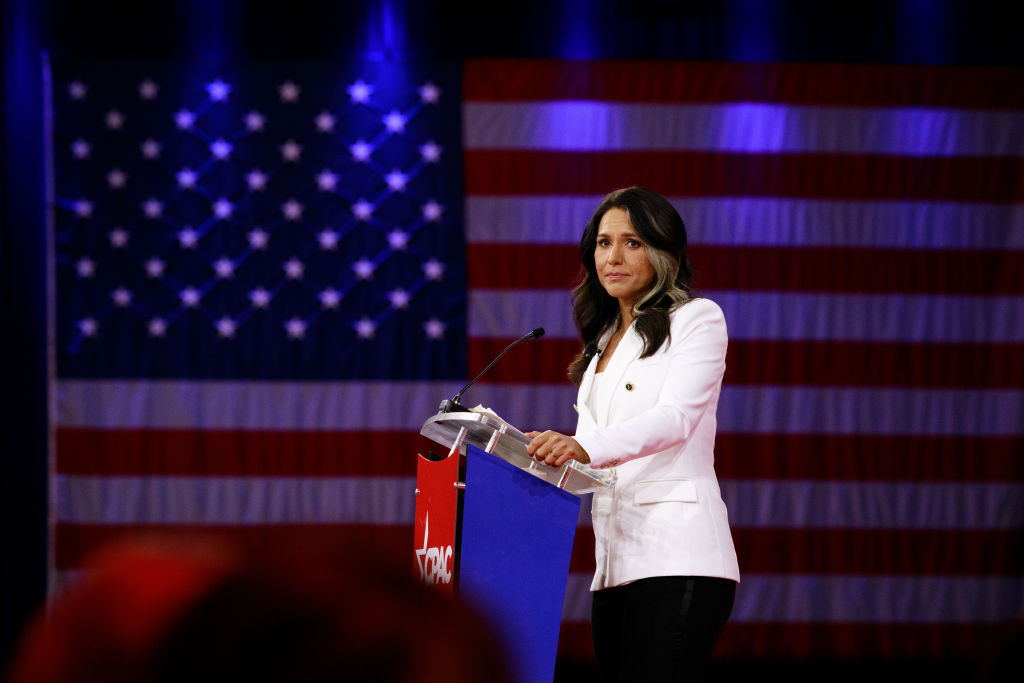Ukraine accuses Tulsi Gabbard and Rand Paul of promoting 'Russian propaganda'


A free daily email with the biggest news stories of the day – and the best features from TheWeek.com
You are now subscribed
Your newsletter sign-up was successful
Ukraine's Center for Countering Disinformation announced Monday that it had compiled a list of American citizens who have been "promoting Russian propaganda."
The center, which Ukrainian President Volodymyr Zelensky created in 2021, named Sen. Rand Paul (R-Ky.), former Rep. Tulsi Gabbard (D-Hawaii), journalist Glenn Greenwald, retired U.S. Army Colonel Douglas MacGregor, academic John Mearsheimer, and military historian Edward Luttwak.
Gabbard and Greenwald have endorsed the theory — which Russia promotes and Ukraine denies — that there are dozens of U.S.-funded biolabs in Ukraine. In the early days of the invasion, MacGregor told Fox News that Zelensky was a "puppet" and was "putting huge numbers of his own population at unnecessary risk" by refusing to cave to Russian President Vladimir Putin's demands.
The Week
Escape your echo chamber. Get the facts behind the news, plus analysis from multiple perspectives.

Sign up for The Week's Free Newsletters
From our morning news briefing to a weekly Good News Newsletter, get the best of The Week delivered directly to your inbox.
From our morning news briefing to a weekly Good News Newsletter, get the best of The Week delivered directly to your inbox.
Mearsheimer delivered a lecture in 2015 with the title "Why is Ukraine the West's Fault?" in which he argued that NATO and the EU had driven Ukraine into conflict with Russia by teasing the possibility of membership without ever intending to grant it. Paul made similar statements and has voted against military aid for Ukraine. In April, Luttwak called for a peace deal that would allow disputed territories in the Donbas to hold referendums on whether to join with Russia or remain part of Ukraine.
Fox News host Tucker Carlson, a frequent critic of Zelensky's government, said Monday night that "Ukraine is not a democracy in any recognizable sense" and accused Zelensky of attempting to "impose censorship in our country."
A free daily email with the biggest news stories of the day – and the best features from TheWeek.com
Grayson Quay was the weekend editor at TheWeek.com. His writing has also been published in National Review, the Pittsburgh Post-Gazette, Modern Age, The American Conservative, The Spectator World, and other outlets. Grayson earned his M.A. from Georgetown University in 2019.
-
 Switzerland could vote to cap its population
Switzerland could vote to cap its populationUnder the Radar Swiss People’s Party proposes referendum on radical anti-immigration measure to limit residents to 10 million
-
 Political cartoons for February 15
Political cartoons for February 15Cartoons Sunday's political cartoons include political ventriloquism, Europe in the middle, and more
-
 The broken water companies failing England and Wales
The broken water companies failing England and WalesExplainer With rising bills, deteriorating river health and a lack of investment, regulators face an uphill battle to stabilise the industry
-
 What would a UK deployment to Ukraine look like?
What would a UK deployment to Ukraine look like?Today's Big Question Security agreement commits British and French forces in event of ceasefire
-
 Would Europe defend Greenland from US aggression?
Would Europe defend Greenland from US aggression?Today’s Big Question ‘Mildness’ of EU pushback against Trump provocation ‘illustrates the bind Europe finds itself in’
-
 Is conscription the answer to Europe’s security woes?
Is conscription the answer to Europe’s security woes?Today's Big Question How best to boost troop numbers to deal with Russian threat is ‘prompting fierce and soul-searching debates’
-
 Trump peace deal: an offer Zelenskyy can’t refuse?
Trump peace deal: an offer Zelenskyy can’t refuse?Today’s Big Question ‘Unpalatable’ US plan may strengthen embattled Ukrainian president at home
-
 The Baltic ‘bog belt’ plan to protect Europe from Russia
The Baltic ‘bog belt’ plan to protect Europe from RussiaUnder the Radar Reviving lost wetland on Nato’s eastern flank would fuse ‘two European priorities that increasingly compete for attention and funding: defence and climate’
-
 How should Nato respond to Putin’s incursions?
How should Nato respond to Putin’s incursions?Today’s big question Russia has breached Nato airspace regularly this month, and nations are primed to respond
-
 What will bring Vladimir Putin to the negotiating table?
What will bring Vladimir Putin to the negotiating table?Today’s Big Question With diplomatic efforts stalling, the US and EU turn again to sanctions as Russian drone strikes on Poland risk dramatically escalating conflict
-
 The mission to demine Ukraine
The mission to demine UkraineThe Explainer An estimated quarter of the nation – an area the size of England – is contaminated with landmines and unexploded shells from the war
